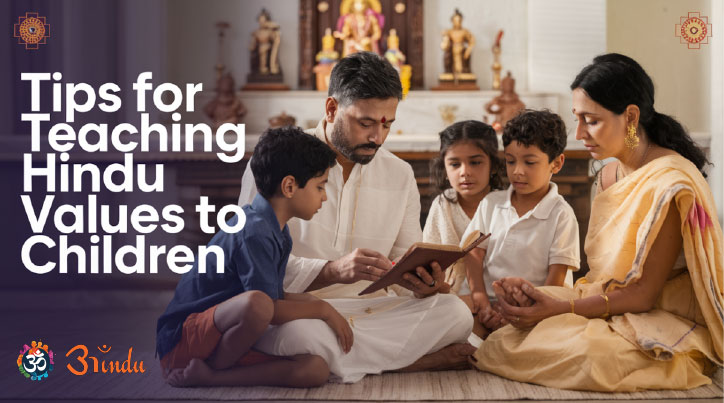
In today’s rapidly changing world, instilling strong values in children is more crucial than ever. For Hindu families, passing down their rich cultural and spiritual heritage is a deeply cherished responsibility. But how do we effectively teach Hindu values to children in a way that resonates with them and helps them navigate the complexities of modern life? This blog explores practical and engaging strategies for nurturing a strong foundation of Hindu values in the next generation. It’s about more than just rituals and stories; it’s about cultivating character development, fostering spiritual growth, and creating a lifelong connection to their heritage.
Explore Blog Content
ToggleWhy Teach Hindu Values to Children?
Hindu values provide a moral compass, guiding children towards righteous conduct, compassion, and respect for all beings. They offer a framework for understanding their place in the world, fostering a sense of belonging, and connecting them to a rich cultural heritage. Teaching Hindu values helps children develop:
- Strong moral character: Honesty, integrity, kindness, and empathy.
- Respect for elders and traditions: Understanding the wisdom of generations past.
- A sense of community: Connecting with their cultural roots and belonging to a larger family.
- Spiritual awareness: Developing an appreciation for the divine and their own inner selves.
- Resilience and adaptability: Navigating challenges with grace and wisdom.
Making it Engaging: Storytelling and Play
Children learn best through engaging experiences. Storytelling is a powerful tool for transmitting Hindu values. Share stories from the Ramayana, the Mahabharata, the Puranas, and Panchatantra. These narratives are filled with valuable lessons about dharma (righteous duty), karma (action and consequence), and the importance of good conduct.
- Puppet shows and dramas: Bring these stories to life through creative performances.
- Role-playing: Encourage children to act out scenarios that illustrate Hindu values.
- Games: Create games that teach about Hindu deities, festivals, and traditions.
"The greatness of a culture lies in its ability to transmit its values to the next generation."Jawaharlal Nehru
Integrating Values into Daily Life
Hindu values shouldn’t be confined to special occasions or religious ceremonies. Integrate them into everyday life:
- Family discussions: Talk about the meaning of different values and how they apply to everyday situations.
- Modeling good behavior: Children learn by observing the adults around them. Be a role model for the values you want to instill.
- Seva (selfless service): Involve children in community service projects to teach them the importance of giving back.
- Respect for nature: Teach children about the interconnectedness of all living things and the importance of environmental stewardship.
Celebrating Festivals and Traditions
Festivals are a vibrant expression of Hindu culture and offer a fun and engaging way to teach children about their heritage.
- Explain the significance: Don’t just celebrate the rituals; explain the stories and symbolism behind each festival.
- Involve children in preparations: Let them help with decorations, cooking, and other festive activities.
- Share traditional foods: Food is an integral part of Hindu culture. Introduce children to the diverse cuisine associated with different festivals.
Introducing Children to Scriptures and Prayers
Age-appropriate introductions to scriptures and prayers can be a valuable part of their spiritual development.
- Start with simple prayers: Teach them basic prayers and mantras.
- Share stories from the scriptures: Introduce them to simplified versions of stories from the Ramayana, Mahabharata, and other scriptures.
- Encourage chanting and bhajans: These devotional practices can create a positive and spiritual atmosphere.
The Importance of Open Communication
Create a safe space for children to ask questions and express their doubts.
- Listen actively: Pay attention to their concerns and address them with patience and understanding.
- Encourage dialogue: Foster open communication about faith, values, and ethical dilemmas.
- Be honest and transparent: Don’t be afraid to admit when you don’t have all the answers. Explore questions together.
"Character is the highest of all virtues."Swami Vivekananda
Addressing Challenges in a Modern World
Children growing up in today’s world face unique challenges. It’s important to equip them with the tools to navigate these complexities while staying true to their values.
- Discuss ethical dilemmas: Engage in conversations about real-life situations and how Hindu values can guide their decisions.
- Teach them about tolerance and respect: Emphasize the importance of respecting people of all faiths and backgrounds.
- Promote critical thinking: Encourage children to think for themselves and develop their own understanding of Hindu values.
Fostering a Sense of Pride and Belonging
Help children develop a sense of pride in their Hindu heritage.
- Share your own experiences: Talk about what your faith means to you and how it has shaped your life.
- Connect with the community: Participate in temple activities and cultural events.
- Celebrate their identity: Encourage them to embrace their cultural identity and share it with others.
Summary
Teaching Hindu values to children is a vital part of nurturing their character, fostering their spiritual growth, and connecting them to their rich cultural heritage. By using engaging methods like storytelling, play, and integrating values into daily life, parents can instill a strong foundation of Hindu principles in their children. Open communication, celebrating festivals, and age-appropriate introductions to scriptures and prayers can further enhance their understanding and connection to their faith. Equipping children with the tools to navigate the challenges of the modern world while staying true to their values is essential for their well-being and the continuation of Hindu traditions.
FAQs
- How do I make Hindu values relatable to children?
Use stories, games, and real-life examples to illustrate the meaning and relevance of these values. - At what age should I start teaching Hindu values?
It’s never too early to start. Even young children can learn through stories, songs, and observing the adults around them. - How can I teach my child about different Hindu deities?
Use picture books, stories, and role-playing to introduce them to the different deities and their significance. - How can I explain the concept of karma to a child?
Use simple examples to illustrate the principle of cause and effect, emphasizing that good actions lead to good consequences. - How do I balance teaching Hindu values with modern life?
Integrate values into everyday life and engage in open discussions about ethical dilemmas and challenges. - How can I encourage my child to participate in temple activities?
Make temple visits fun and engaging by explaining the rituals and stories associated with the deities. - What are some good resources for teaching Hindu values to children?
Many books, websites, and organizations offer resources for parents and educators. Look for age-appropriate materials. - How can I teach my child about tolerance and respect for other religions?
Emphasize the Hindu principle of “Vasudhaiva Kutumbakam” (the world is one family) and encourage open dialogue about different faiths.







